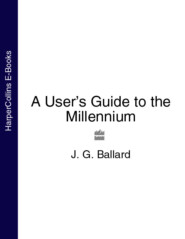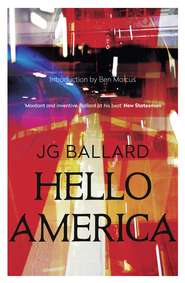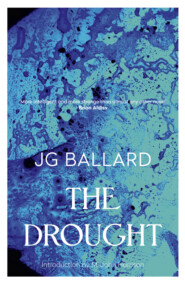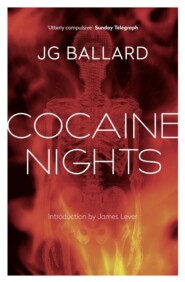По всем вопросам обращайтесь на: info@litportal.ru
(©) 2003-2024.
✖
The Day of Creation
Настройки чтения
Размер шрифта
Высота строк
Поля
3
Think back, now, to the way movies used to be – not on computers, but in halls – not digital, but analogue, a succession of frames flowing off a reel like water until all that was left was a flume of hot white light projecting its pristination at a screen. Think back to the size of the screens and so to the size of the people on them – people firmamental, stars – skygods enacting myths in perpetual sequel.
What I mean is: Apocalypse Now. Directed by Francis Ford Coppola in 1976 but released only in 1979. Apocalypse Now features title cards and is narrated by Captain Willard (Martin Sheen), who is dispatched upriver – the fictional Nung River – to terminate Colonel Kurtz (Marlon Brando), who has ‘gone native’, and formed a private militia to fight his private wars. The film’s production was notoriously plagued: principal photography in the Philippines was interrupted by typhoon season; Harvey Keitel was fired (for reasons never publicized), and replaced by Sheen, who promptly had a heart attack; Brando showed up unprepared, obese, and with his head shaved; Dennis Hopper, who plays a traumatized photojournalist, was method acting his way through a coke-binge. At least ‘the extras’ were reliable – scores of Vietnamese who’d fled one violent insurrection for another. President Marcos regularly demanded the return of the army helicopters the production were renting, which he scrambled to surveil and even strafe the New People’s Army of the illegal CPP, the Communist Party of the Philippines. This drama behind the drama made its way into a documentary assembled by Eleanor Coppola, in which her director-husband can’t stop himself from airing the resemblance between the psychologies of artistic creation and military-industrial destruction: ‘We were in the jungle, there were too many of us, we had access to too much money, too much equipment, and little by little we went insane.’
Hearts of Darkness is the title of that making-of documentary, and it’s obvious to everyone sweating in it – except Brando, who refused to do any reading – that Apocalypse Now is based on Conrad’s Heart of Darkness. In that novella, Marlow, the original of Willard, steamboats up the Congo River scouring the rainforest for the rogue ivory-trader, and slaver, Kurtz. In Conrad’s telling neither Marlow nor Kurtz are elite soldiers, but are or were employees of ‘the Company’, and the setting is the Central African Congo Free State, which was, in fact, a corporation wholly owned and operated by Belgium. Another liberty Coppola took: his Kurtz is assassinated by Willard, while the page-bound Kurtz dies slowly, and Marlow falls ill, from ‘an impalpable greyness’, ‘a sickly atmosphere of tepid scepticism’. Heart of Darkness was serialized in 1899, and republished in 1902 as the middle novella of a trilogy that bridged the stages of terraqueous life: preceding it is Youth, in which the foreign is exotic, yet nurturing; following it is The End of the Tether, in which the foreign has become indistinguishable from home and the only Empire left is a watery grave. Between the two fictions – between birth and death – is dream: ‘It seems to me I am trying to tell you a dream – ’ Marlow says, ‘making a vain attempt, because no relation of a dream can convey the dream-sensation, that commingling of absurdity, surprise, and bewilderment in a tremor of struggling revolt, that notion of being captured by the incredible which is of the very essence of dreams … ’
Heart of Darkness, of course, has its own ur-versions, its own unconscious – in the legends that European and Anglo-American writers translated from, and were inspired to invent by, the African and Asian cultures they nonetheless regarded as ‘primitive’, or ‘inferior’. Stay close, because we’re approaching the Inmost Station.
We have stories about treasure hunters who leave their lands and wander the globe, only to be recalled by a dream of a willow in their house’s yard, under which a hoard of gems is buried; we have tales of hunters slaying wild boars whose carcasses metamorphose into the corpses of fathers. Then there’s ‘My First Day in the Orient’, an essay of around 1890 by the half-Greek, half-Irish Lafcadio Hearn, who spent two decades as a reporter and English tutor in Japan:
Then I reach the altar, gropingly, unable yet to distinguish forms clearly. But the priest, sliding back screen after screen, pours in light upon the gilded brasses and the inscriptions; and I look for the image of the Deity or presiding Spirit between the altar-groups of convoluted candelabra. And I see – only a mirror, a round, pale disk of polished metal, and my own face therein …
An adventurer seeks the divine, and finds himself instead. Tug aside the curtain, and the man is the Maker, and the Maker is the man – ‘The horror! The horror!’
Imagine if Apocalypse Now was filmed again with state-of-the-art CGI, so that Willard survives his river cruise only to discover that he is Kurtz. (Which would’ve been preferable, if Sheen had played both the roles? Or Brando?)
Imagine Heart of Darkness rewritten so that Marlow makes the same discovery – and now he is foundered, crazed, suicidal.
All this brings us, by a commodius vicus of recirculation, back to The Day of Creation, in which Mallory (which is ‘Marlow’ mixed with ‘Ballard’) sets out toward the source of his river, which might not be Lake Chad or the mountains of the Massif, but his own deluged deluded brain: malnourished, fevered. The River Mallory is the doctor’s crosscurrent double, an inconstant, alternately reflecting/reflected ‘black mirror’. ‘I tried to stand back from my own obsession,’ Mallory says, ‘but I could no longer separate myself from my dream of the Mallory.’
In the first book of the first of the books, the Bible, ‘The Day of Creation’ occurred a full week before Paradise even existed: ‘And the earth was without form, and void; and darkness was upon the face of the deep,’ and everything would’ve been perfectly peaceful, if God hadn’t said, ‘Let there be light’ – and there was light. Ballard’s novel reminds us that we’ve suffered ever since for our projections.
Brooklyn, March 2014
1. Around 1969, George Lucas tried to make a version of the John Milius script, but his proposal to shoot it in 16mm as a pseudo-documentary on location in South Vietnam, with the war still in progress, found no support at the studios. Coppola channeled this conceit through a brief cameo in his own movie as a telejournalist yelling at Air-Cav soldiers who’ve just razed a village: ‘Don’t look at the camera! Just go by like you’re fighting!’ In 1971, Dennis Hopper released The Last Movie, which he directed and starred in as ‘Kansas’, a stuntman on a Western being filmed in Peru. Kansas stays on after the production has wrapped, and makes an attempt at a calmer if romanticized life with a native prostitute. Their idyll is threatened, however, once an indigenous tribe, misunderstanding the Hollywood fakery, fashions equipment out of bamboo and starts ‘filming’ a Western in which the violence isn’t staged, but fatal.
1 (#u5f39b0b7-882f-5752-a843-9ac082793201)
The Desert Woman (#u5f39b0b7-882f-5752-a843-9ac082793201)
Dreams of rivers, like scenes from a forgotten film, drift through the night, in passage between memory and desire. An hour before dawn, while I slept in the trailer beside the drained lake, I was woken by the sounds of an immense waterway. Only a few feet from me, it seemed to flow over the darkness, drumming at the plywood panels and unsettling the bones in my head. I lay on the broken mattress, trying to steady myself against the promises and threats of this invisible channel. As on all my weekend visits to the abandoned town, I was seized by the vision of a third Nile whose warm tributaries covered the entire Sahara. Drawn by my mind, it flowed south across the borders of Chad and the Sudan, running its contraband waters through the dry river-bed beside the disused airfield.
Had a secret aircraft landed in the darkness? When I stepped from the trailer I found that the river had gone, vanishing like a darkened liner between the police barracks and the burnt-out hulk of the cigarette factory. A cool wind had risen, and a tide of sand flowed over the bed of the lake. The fine crystals beside the trailer stung my bare feet like needles of ice, as the invisible river froze itself when I approached.
In the darkness the ivory dust played against the beach in a ghostly surf. Nomads had built small fires, refugees from the Sudan who rested here on their way south to the green forest valleys of the River Kotto. Each weekend I found that they had torn more planks from the hull of Captain Kagwa’s police launch, lighting the powdery timbers with strips of celluloid left behind by the film company. Dozens of these pearl-like squares emerged from the sand, as if the drained lake-bed was giving up its dreams to the night.
Once again I noticed that a strange woman had been here, gathering the film strips before they could be destroyed. I have seen traces of her for the past weeks, the curious footprints on the dispensary floor, with their scarred right heels and narrow thumb-like toes, and her absentminded housework around the trailer. For some time now I have suspected that she is keeping watch on me. Any food or cigarettes that I leave behind are always removed. I have even placed a small present for her on the trailer steps, a plastic viewfinder and a set of tourist slides of the Nile at Aswan, the humour of which might appeal to her. Last weekend, when I arrived at the trailer, I found that the mattress had been repaired with wire and string, though perhaps for her comfort rather than mine.
The thought that I may be sharing a bed with one of these young desert women adds a special glamour to my dreams of the night-river. If she suffers from eczema or impetigo I will soon carry the infection on my skin, but as I lie in the bunk I prefer to think of her naked to the waist, bathing in the warm waters that flow inside my head.
However, her main interest is clearly in the film strips. When I returned to the trailer I found a plastic bucket tucked behind the wooden step. I knelt in the cold dust, and searched through the curious rubbish which this young woman had collected – empty vaccination syringes from the dispensary floor, the sailing times of the Lake Kotto car ferry, a brass cartridge case and the lens cover of a cine-camera lay among the clouding film strips gathered from the beach.
Together these objects formed a record of my life, an inventory that summed up all the adventures that had begun in this shabby town in the northern province of a remote central African republic. I held the cartridge case to my lips, and tasted the strange scent, as potent as the memory of Noon’s embrace, that clung to its dull metal. I thought of my journey up the Mallory, and of my struggle with the great river which I had created and tried to kill. I remembered my obsession with Noon, my duel with Captain Kagwa’s helicopter, and all the other events which began a year ago when General Harare and his guerillas first came to this crumbling town.
2 (#u5f39b0b7-882f-5752-a843-9ac082793201)
The Gunmen (#u5f39b0b7-882f-5752-a843-9ac082793201)
‘Dr Mallory, are you going to be executed?’
I searched for the woman shouting to me, but a rifle barrel struck me across the shoulders. I fell to the ground at the gunmen’s feet, and cut my hand on a discarded canister of newsreel film which the Japanese photographer was feeding into her camera. In a few seconds, I realized, the expensive celluloid would see its first daylight while recording my own death.
Fifteen minutes later, when General Harare had withdrawn his guerillas into the forest, leaving the lakeside town he had occupied for a few frightening hours, I was still trying not to answer this all too loaded question. Thrown at me like a query at a chaotic press conference, it summed up the dangers of that last absurd afternoon at Port-la-Nouvelle.
Was I going to be shot? As the guerillas bundled me on to the beach below the police barracks, I called to the young Japanese in her silver flying overalls.
‘No! Tell Harare I’ve ordered a new dental amalgam for his men. This time the fillings will stay in …’
‘The fillings …?’
Hidden behind her hand-held camera, Miss Matsuoka was swept along by the group of excited soldiers running down to the lake, part beach-party and part lynch mob. There was a confusion of yodelling whoops, weapons playfully aimed at the sun, and knees twisting to the music that pumped from the looted radios and cassette players strung around the gunmen’s necks among their grenades and ammunition pouches.
There was a bellow from General Harare’s sergeant, a former taxi driver who must once have glimpsed a documentary on Sandhurst or St Cyr in a window of the capital’s department store. With good-humoured smiles, the soldiers fractionally lowered the volume of their radios. Harare raised his long arms at his sides, separating himself from his followers. The presence of this Japanese photographer, endlessly scurrying at his heels, flattered his vanity. He stepped from the beach on to the chalky surface of the drained lake-bed, stirring the milled fish bones into white clouds, a Messiah come to claim his kingdom of dust. Dimmed by heavy sunglasses, his sensitive, malarial face was as pointed as an arrowhead. He gazed piercingly at the horizons before him but I knew that he was thinking only of his abscessed teeth.
Behind me a panting twelve-year-old girl in an overlarge camouflage jacket forced me to kneel among the debris of beer bottles, cigarette packs and French pornographic magazines that formed the tide-line of the beach. Prodding me with her antique Lee-Enfield rifle, this child auxiliary had driven me all the way from my cell in the police barracks like a drover steering a large and ill-trained pig. I had treated her infected foot when she wandered into the field clinic that morning with a party of women soldiers, but I knew that at the smallest signal from Harare she would kill me without a thought.
Filmed by the Japanese photographer, the General was walking in his thoughtful tread towards the wooden towers of the artesian wells whose construction I had supervised for the past three months, and which symbolized the one element he most detested. I sucked at the wound on my hand, but I was too frightened to wet my lips. Praying that the wells were as dry as my mouth, I looked back at the deserted town, at the looted stores visible above the teak pillars of the jetty where the car ferry had once moored ten feet above my head. Behind the party of guerillas, some lying back on the beach beside me, others dancing to the music of cassette players, I could see a column of smoke lifting from the warehouse of the cigarette factory, like a parody of a television commercial for the relaxing weed. A pleasant scent bathed the beach, the aroma of the rosemary-flavoured tobacco leaf which the economists at the Institut Agronomique had decided would transform the economy of these neglected people, and provide a stable population from which the local police chief, Captain Kagwa, could recruit his militia.
Turned by the light wind, the smoke drifted towards the dusty jungle that surrounded the town, merging into the haze fed by an untended backyard incinerator. Beyond the scattered tamarinds and shaggy palms the whitening canopy of forest oaks stood at the mouth of a drained stream whose waters had filled Lake Kotto only two years earlier. Their dying leaves blanched by the sun, the huge trees slumped among the stony sand-bars, tilting memorials in a valley of bones.
I inhaled the scented air. If I was to be executed, it seemed only just that I, renegade physician in charge of the drilling mission whose water would irrigate the tobacco projects of Port-la-Nouvelle and supply the cities of the former French East Africa with this agreeable carcinogen, should be given an entire warehouse of last cigarettes.
Still trailed by the Japanese photographer, Harare strode towards the beach. Had one of the dry wells miraculously yielded water for this threadbare redeemer? His thin arms, touching only at the wrists, were pointing to me, making an assegai of his body. I sat up and tried to straighten my blood-stained shirt. The guerillas had turned their backs on me, in a way that I had witnessed on their previous visits. When they no longer bothered to guard their prisoners it was a certain sign that they were about to dispense with them. Only the twelve-year-old sat behind me on the beach, her fierce eyes warning me not even to look at the bandage I had wrapped around her foot. I remembered Harare’s pained expression when he gazed into my cell at the police barracks, and his murmured reproach, as if once again I had wilfully betrayed myself.
‘You were to leave Port-la-Nouvelle, doctor. We made an agreement.’ He seemed unable to grasp my real reasons for clinging to this abandoned town beside the fossil lake. ‘Why do you need to play with your own life, doctor?’
‘There’s the dispensary – it must stay open as long as there are patients. I treated many of your men this morning, General. In a real sense I’m helping your war effort.’
‘And when the government forces come you will help their war effort. You are a strategic asset, Dr Mallory. Captain Kagwa will kill you if he thinks you are useful to us.’
‘I intend to leave. It seems time to go.’
‘Good. This obsession with underground water – your career has suffered so much. You always have to find the extreme position.’
‘I shall be thinking about my career. General.’
‘Your real career, not the one inside your head. It may be too late …’
The radios were playing more loudly. A young guerilla, his nostrils plugged with pus from an infected nasal septum, danced towards me, eyes fixed knowingly on mine, his knees tapping within a few inches of my face. I remembered the Japanese woman’s question, and its curious assumption that I had contrived this exercise in summary justice, among the beer cans and pornographic magazines on this deserted beach at the forgotten centre of Africa, and that I had already decided on my own fate.
3 (#u5f39b0b7-882f-5752-a843-9ac082793201)
The Third Nile (#u5f39b0b7-882f-5752-a843-9ac082793201)
The guerilla unit had emerged from the forest at nine that morning, soon after the government spotter plane completed its daily circuit of Lake Kotto. During the night, as I lay awake in the trailer parked behind the health clinic, I listened to the rebel soldiers moving through the darkness on the outskirts of Port-la-Nouvelle. The beams of their signal torches touched the window shutters beside my bunk, like the antennae of huge nocturnal moths. Once I heard footsteps on the gravel, and felt a pair of hands caress the steel framework of the trailer. For a few seconds someone gently rocked the vehicle, not to disturb my sleep, but to remind me that the next day I would be shaken a little more roughly.
By dawn, as I drove my jeep to the drilling site, the town was silent again. However, as I opened my bottle of breakfast beer on the engine platform of the rig I saw the first of the guerillas guarding the steps of the police barracks, and others moving through the empty streets. Beyond the silent quays, in the forecourt of the looted Toyota showrooms, Harare stood with his bodyguard among the slashed petrol pumps, his feet shifting suspiciously through the shards of plate glass.










